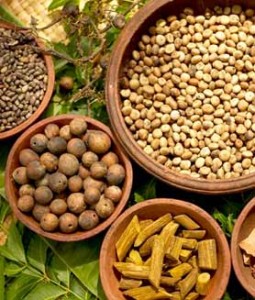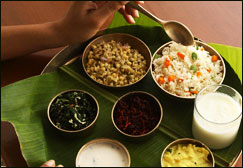 Nourishing yourself correctly is the first and primary way to achieve good health in the physical body, which affects the many levels of the body beyond: the mind and energetic bodies.
Nourishing yourself correctly is the first and primary way to achieve good health in the physical body, which affects the many levels of the body beyond: the mind and energetic bodies.
Our food is medicinal, and helps us to feel strong and grounded. Wholesome and natural unprocessed foods are the best nourishment we can offer ourselves.
Ayurveda suggests that to achieve balance and harmony within, one should eat food suitable to their constitution and season in order to achieve optimum health. Whether you aim to have more energy to go about your day, feel stronger, bring the body back to health from illness, or lose or gain muscle tissue, cooking and eating with awareness can be the key.
When you are restoring the body into balance, warm and easy to digest meals are the key. Cooked foods are important, so the body can digest this food easily, in comparison to cold, dry and raw foods, which are difficult for a weakened system to digest and obtain nutrients from.
The season is changing to Winter and Ayurveda always works with the season’s as well as your personal constitution. Choosing the best foods, herbs and spices for your body and mind helps your innate bodily intelligence remain strong.
 When you cook and eat Ayurvedically you are learning how to combine certain foods and spices so that they suit your constitution. Eating Ayurvedically does not necessarily eating only Indian food. Indian food and Ayurvedic food can actually be quite different.
When you cook and eat Ayurvedically you are learning how to combine certain foods and spices so that they suit your constitution. Eating Ayurvedically does not necessarily eating only Indian food. Indian food and Ayurvedic food can actually be quite different.
Italian, Western, Thai, Japanese foods can all be cooked medicinally with a feel for what the wisdom of Ayurveda has to offer us. You are learning to listen to your body, and open your senses to your foods, herbs and spices. This creates harmony between you and what you put into your body from the outside world. There is a great book by Miriam Stoppard named ‘Heavens Banquet’, whcih brings foods from all over the World to life through Ayurveda.
Ideal foods for Winter are as below. Please note: ideally it is best to consult with an Ayurvedic practitioner to find out what foods and herbs best suit your constitution.
Below are some general ideas for most types (doshas).
Best spices to use for warming the body are cumin, mustard seeds, and black pepper. Sweeter herbs such as cardamon cinnamon and cloves can also be used in Winter to warm the body and promote circulation.
Daily Upon rising: Morning drink of fresh ginger, lemon, and honey tea. Honey to be added after water is warm and less than 75 degrees, rather then hot.
BREAKFAST:
Warm porridge (oat, rice or semolina) made with warm organic milk, cinnamon and cardamon.
OR Buckwheat pancakes (best for Kapha types)
OR Warm stewed fruit with cinnamon, cloves, ginger.
LUNCH:
Include protein foods here with…
Vegeatable soups (with rice or yeast free breads)
OR Rice and vegetables
OR Chickpea or mung bean dahl with rice
High protein meals should be included here, as at lunchtime digestion is strongest. If required include fish OR chicken OR eggs here. Cook proteins with turmeric and black pepper, ginger to make it easier to digest. Try to keep to just one high protein food per meal, rather then combining.
Vegetarian options are easier to digest, so you may choose well-cooked beans and pulses OR white cheeses such as ricotta OR paneer (Indian grocer).
If bread is to be taken, use toasted sourdough yeast free bread, or flat breads.
Those with digestive imbalances should look at trying to keep all foods cooked until the system improves and becomes stronger again.
DINNER:
Rice, beans and vegetables
OR Vegetable soup
OR vegetable curry/ stir fry
OR mung dahl (mung bean curry)
OR lentil soup
Dinner meal should be light and vegetarian wherever possible so that you are not digesting meat products well into the night. If you do feel you need higher forms of protein, try eggs or the smaller beans which are easy to digest such as lentils or mung.
SNACKS:
Soaked and peeled almonds with raisins are ideal for sweet cravings at mid morning or afternoon.
OR Toasted seeds and nuts
OR Stewed fruits of apple pear
FLUIDS should be taken warm at all times. Herbal teas, and ayurvedic chai are also great substitutes for coffee. Avoid drinking fluids with meals, and this weakens digestion. Take fluids at least 30 minutes beforehand, or 60 mins afterwards. If this is too difficult, sip warm water with meals.
FOODS TO BE AVOIDED whilst healing the body and beyond:
Foods that have lost their prana (their energy) and can aggrevate your constitution are processed foods, coffee, alcohol, chocolate, microwaved foods, fermented foods, fried foods, yeasted breads, tomato sauce, chilli sauce, cold and raw and dry foods, undercooked or overcooked foods, frozen foods and leftovers more then 48hours old.
DO REMEMBER:
To avoid mental ridigity when choosing foods. If we label foods as ” good or bad” from a mental position, then our adherance to these beliefs can create mental ama (toxins) that can affect us negatively. The body naturally gravitates towards foods that are aligned with our current mind body conciousness. Whatever foods we do choose in the moment are perfect for us, until we make another choice in the next. This gives us the freedom to trust that we can be present when eating and enjoy whatever foods we choose to. Thus eating becomes a reverential activity, rather than an activity that is based from only the mind, an unconcious activity. When the body is restored back to health and vitality, food choices become natural and intuitive.
FOODS TO CONSUME are fresh, wholesome, nutritious and nourishing foods. These foods should stimulate the senses and appeal to the eye. They should be warm, easy to digest, and full of moisture. Cook with love and gratitude, and with the knowledge that your foods will nourish and support you and all those who consume them In this way cooking can be practised as a true joy, a meditation within itself.
When using milk, choose full cream unhomogenised organic milk (try Barambah) should always be warmed to split the proteins and make it easier to digest. Kapha types may use half fat milk.
All six tastes should be included in the diet for all constitutions in varying degrees:
VATA types benefit most from: Sweet, salty, sour tastes
PITTA types benefit most from: Sweet, bitter and astringent tastes
KAPHA types benefit most from: Pungent, bitter, astringent tastes.



